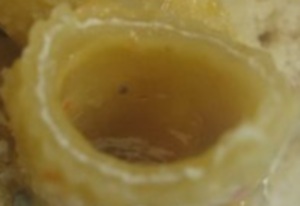"Al dente" is used to refer to food cooked so it is still "firm to bite" but not soft
This is very important to pasta which should be removed from the cooking liquid just before it has fully cooked through, as like most foods, it will continue to cook after being removed from the heat source
Always gently stir your pasta every minute or so while cooking to ensure it cooks evenly. Then near the end of the cooking time, bite into a piece of paste every 15 seconds or so to see if it has nearly cooked through. It should be firm to bite, and not soft all the way through. It should not resist biting though
With some pasta types like Penne etc. you can sometimes actually see the uncooked inner layer (a thin white line) if you carefully slice it in half which a knife, or just bite cleanly with your teeth

If the pasta is going to be mixed into a hot liquid sauce before serving, take the pasta out of the cooking liquid at an even firmer point
The term "al dente" can be used for all cooked foods that should be cooked to just before soft, and then served (fresh greens, thin meat cuts etc.)
The reason for all of this is that there have been many flavour and nutrition benefits noted when cooking to this point. Also for pasta it tends to fall apart if cooked past "al dente"

